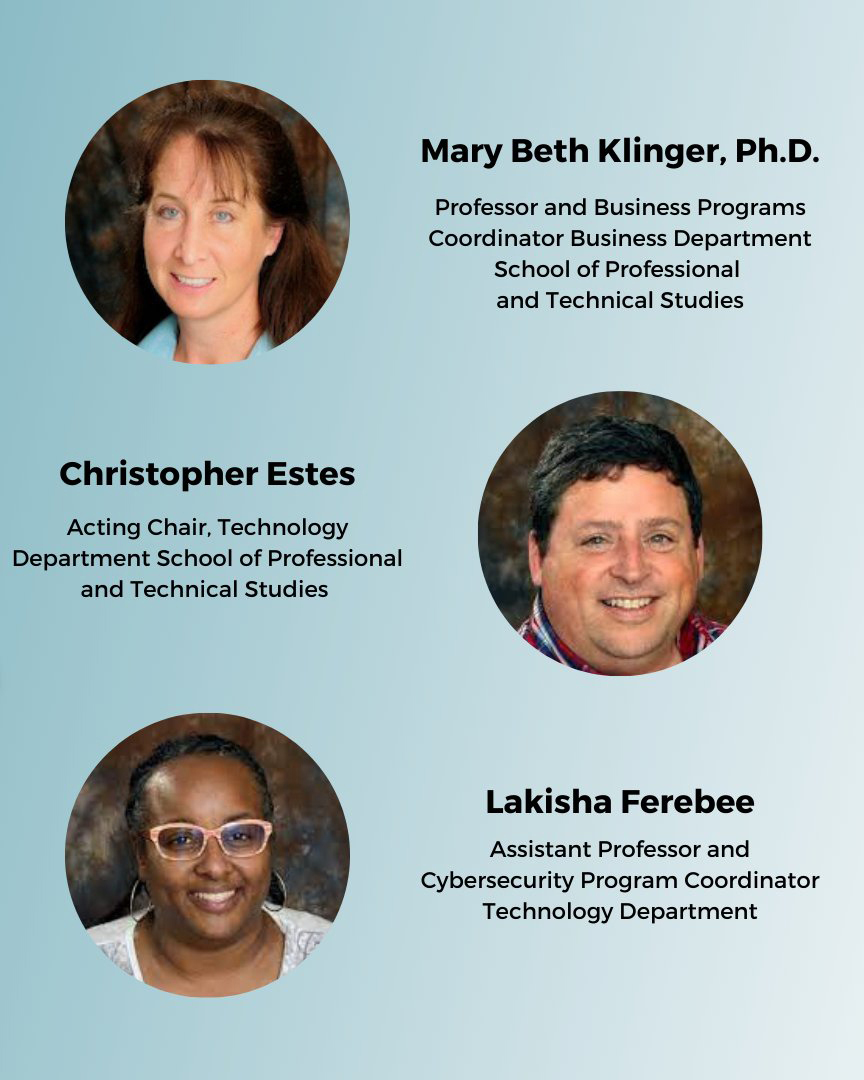CSM Faculty Earn National Recognition for Efforts to Partner with Cybersecurity Industry and Build Career Opportunities for Underrepresented Students

CSM Faculty Earn National Recognition for Efforts to Partner with Cybersecurity Industry & Build Career Opportunities for Underrepresented Students
Innovative teaching methods and creating an atmosphere of excitement around a career in cybersecurity earned the College of Southern Maryland’s (CSM) Cybersecurity faculty national recognition from the National Cyberwatch Center’s Innovations in Cybersecurity Education program. CSM’s faculty won Best Submission runner-up for their efforts to collaborate with government, industry and students to create a sustainable regional effort to strengthen workforce needs and broaden opportunities for students currently underrepresented in the cybersecurity workforce.
CSM Professor and Business Coordinator Dr. Mary Beth Klinger, Chair of Technology Christopher Estes, and Lakisha Ferebee, assistant professor and Cybersecurity Program coordinator, shared their collective work during a recent webcast entitled "The Importance of Community and Connectedness in Cybersecurity” via Zoom Oct. 21.
"This award is a well-deserved recognition of the important work being done to help students from all backgrounds embark on a successful career in cybersecurity,” said CSM Dean of the School of Professional and Technical Studies Bernice Brezina. “I'm proud that our faculty are recognized as leaders in educating future cybersecurity professionals, and I hope that their presentation serves as a guide for others in this field."
The presentation summarized how the college adapted its “Cybersecurity Workforce: Bridging the Gap” courses during the pandemic to keep cybersecurity students who are supported by a grant from the National Science Foundation (NSF) engaged. It also highlighted ways that CSM is measuring success in creating a social and learning community through this grant project.
“We are constantly trying to innovate and try new things while still giving students an education that makes them competitive in the workforce,” says Klinger. “Ultimately our end goal is to provide students with the joy of a cyber career.”
That “joy” is an important part of the project, according to the CSM team, because if students feel engaged in their learning and with each other, it results in the student having a deeper commitment to the cybersecurity profession and creates a positive student-school-industry relationship. To help measure that sense of connectedness, CSM’s cyber students completed a “project community scale” questionnaire at the start of their studies. This 20-question survey focused on students’ feelings as they related to caring, support, community and desire to learn, and will be repeated as students exit the project.
“The program, along with the individuals involved, have changed my trajectory and increased my potential,” said CSM student Delonta Monroe, of Owings, who plans to graduate with an associate degree in Cybersecurity next spring. “The activities I participated in funded by NFS grant gave me confidence, letting me know that I do belong in this field, and [I am gaining the] experience I needed.”
The country currently faces a shortage of cybersecurity workers; cybersecurity jobs represent nearly 6% of all open jobs in the country, and for almost every two cybersecurity jobs in the United States, a third job goes unfilled because of a worker shortage, according to data compiled by Microsoft. Meanwhile, the field also lacks diversity in its workforce. Currently, 82.4% of the country’s cybersecurity jobs are held by men and 80% are held by people who are white, Microsoft found. CSM and all community colleges are seen as ideal places to solve both issues, Microsoft President and Vice Chair Brad Smith wrote in a post for the company’s blog, as they are places where diverse students can quickly and affordably earn skills for use in their communities.
The NSF grant also allows for professors to create opportunities for students to participate in team-building events, field trips, career exploration and other activities. However, the pandemic did impact some offerings.
“We didn’t get rid of the activities we had planned for our participants, but instead we had to think very creatively and find ways to provide them with the same experiences, but in a safe way,” says Ferebee. She noted that there were some benefits to virtual events, like being able to present high-profile speakers who otherwise would not have been able to travel to campus.
CSM received the NSF grant project in 2019, and the first group of students were accepted in fall 2020. The second cohort was accepted in fall 2021. The grant aims to help CSM recruit, retain and graduate students who are currently underrepresented in the cybersecurity workforce, with the goal of growing the cybersecurity talent pipeline in Southern Maryland to meet demand for these professionals, creating a diverse, educated and skilled workforce for employers in government, industry and academia.
This is the final year of the NSF “Cybersecurity Workforce: Bridging the Gap” grant, but Klinger said she and her colleagues plan to analyze the feedback they are receiving to determine students’ sense of ‘connectedness’ and community from being a part of this project. They will share results with the larger cybersecurity and academic community, and hope to replicate the best practices that they adopted in this program for future CSM students.
The full presentation can be viewed here.
 my.CSMD
my.CSMD